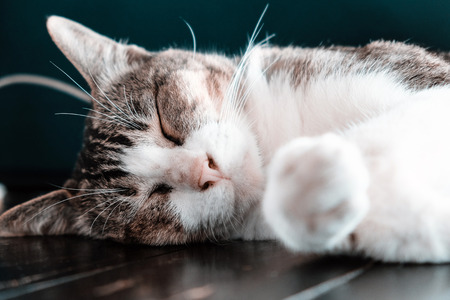Understanding Cat Nutrition Basics
Cats are obligate carnivores, which means their bodies are designed to get nutrients primarily from animal-based sources. Essential nutrients for cats include high-quality proteins, specific amino acids like taurine and arginine, fatty acids such as arachidonic acid, vitamins including A and D, and a variety of minerals. Unlike some other pets, cats cannot synthesize certain nutrients on their own and must obtain them directly from their diet. Most commercial cat foods available in the U.S. are formulated to meet the nutritional guidelines set by organizations like the Association of American Feed Control Officials (AAFCO). These foods typically provide a balanced mix of all the essential nutrients your cat needs for optimal health. For the average healthy cat eating a complete and balanced diet, additional supplements are generally unnecessary. However, understanding what goes into your cat’s food is the first step toward making informed decisions about whether supplements might ever be needed.
Common Types of Cat Supplements
When it comes to cat supplements, there are several popular options that pet owners in the United States frequently consider. These supplements are designed to support various aspects of feline health, from skin and coat quality to digestive and joint wellness. Below is an overview of some of the most common types of cat supplements and what they are typically used for.
| Supplement Type | Main Benefits | Common Uses |
|---|---|---|
| Fish Oil (Omega-3 Fatty Acids) | Promotes healthy skin and a shiny coat; supports heart and brain function; reduces inflammation | Recommended for cats with dry skin, dull fur, or inflammatory conditions like arthritis |
| Probiotics | Supports digestive health; helps maintain a healthy balance of gut bacteria; may reduce diarrhea and improve stool quality | Often given to cats with sensitive stomachs, after antibiotic use, or during dietary changes |
| Vitamins (such as B-complex, Vitamin E, Vitamin D) | Supports overall health; aids in energy production, immune function, and bone development | Used when a cat’s diet may be lacking in specific nutrients, especially for picky eaters or cats on homemade diets |
| Joint Support (Glucosamine, Chondroitin) | Helps maintain joint health; reduces symptoms of arthritis; improves mobility in older cats | Popular among senior cats or those showing signs of stiffness or discomfort during movement |
Each supplement type serves a unique purpose and may benefit certain cats more than others. However, it’s important to note that not all cats need these supplements, especially if they are already eating a balanced commercial diet. Understanding the most common options can help you have informed conversations with your veterinarian about whether your cat might benefit from additional nutritional support.
![]()
3. Do Most Cats Really Need Supplements?
For most healthy cats who are eating a well-balanced, high-quality commercial diet, additional supplements are usually unnecessary. Commercial cat foods in the United States are formulated to meet all of your cat’s nutritional needs, as established by the Association of American Feed Control Officials (AAFCO). These diets are carefully balanced to provide the right levels of vitamins, minerals, amino acids, and other essential nutrients. Giving your cat extra supplements on top of a complete diet can actually do more harm than good. Over-supplementation can lead to toxicity or imbalances that might negatively affect your cat’s health. For example, excess vitamin A can cause joint pain and brittle bones, while too much calcium can interfere with the absorption of other important minerals. Unless your veterinarian has specifically recommended a supplement due to a diagnosed deficiency or medical condition, it’s best to stick with a quality commercial food and avoid unnecessary extras. Always consult your vet before introducing any new supplement to your cat’s routine.
4. When Supplements Might Be Necessary
While most healthy cats on a balanced commercial diet don’t require extra supplements, there are situations where your veterinarian might recommend them. Certain health conditions, aging, or unique dietary needs may create nutritional gaps that supplements can help address. Below is a table highlighting common scenarios when supplements could be necessary:
| Situation | Why Supplements May Help | Common Types of Supplements |
|---|---|---|
| Certain Health Conditions | Chronic illnesses like kidney disease or digestive disorders can impact nutrient absorption. | Probiotics, Omega-3s, B vitamins |
| Aging Pets | Senior cats often experience joint stiffness and reduced cognitive function. | Glucosamine, Chondroitin, Antioxidants |
| Specific Dietary Restrictions | Cats on home-cooked diets or with food allergies may miss out on essential nutrients. | Taurine, Multivitamins, Essential fatty acids |
If your cat falls into any of these categories, consult your veterinarian before adding any supplements to their routine. Self-medicating or giving human supplements can do more harm than good. A vet will assess your cat’s health status and recommend safe options tailored to their specific needs. Remember: supplementing without guidance is rarely beneficial and sometimes even dangerous for your feline friend.
5. Consulting Your Veterinarian
Before starting your cat on any supplement, it’s crucial to have a conversation with your veterinarian. In the United States, veterinarians are trained to assess your cat’s unique health needs and can help determine whether supplements are necessary—or if they might actually do more harm than good. While it’s tempting to self-diagnose or follow online advice, only a vet can provide recommendations based on your cat’s specific age, breed, diet, lifestyle, and existing health conditions.
Vets in the US typically approach supplementation with caution and evidence-based guidelines. They consider the quality and safety of products on the market, as not all supplements are regulated equally. Your vet may recommend blood work or other diagnostic tests before suggesting any additional nutrients. They’ll also be alert to possible interactions with medications or risks of overdosing on certain vitamins and minerals.
Ultimately, your veterinarian is your best resource for making informed decisions about your cat’s well-being. Open communication ensures that any supplement regimen supports—not jeopardizes—your furry friend’s health.
6. Choosing Safe and Effective Supplements
When it comes to picking supplements for your cat, quality and safety should always come first. The supplement industry in the United States is regulated differently for pets than for humans. While the FDA (Food and Drug Administration) oversees animal supplements, many products are classified as “feed additives” rather than medications, which means they may not be tested as rigorously before reaching store shelves. This makes it essential for pet owners to do their homework before introducing any new supplement into their cat’s routine.
Evaluating Supplement Brands
Start by researching brands that are transparent about their sourcing, manufacturing processes, and ingredient lists. Look for companies that follow Good Manufacturing Practices (GMP), ideally verified by third-party organizations such as the National Animal Supplement Council (NASC). Products with the NASC Quality Seal have met high standards for quality control and labeling accuracy.
Check for Third-Party Testing
Reputable brands often submit their products for independent laboratory testing to verify purity and potency. Don’t hesitate to contact manufacturers and ask about test results or certificates of analysis. Avoid supplements with vague ingredient lists or exaggerated claims that sound too good to be true.
Best Practices for Pet Owners
Always consult your veterinarian before starting any supplement—especially since some ingredients can interact with medications or cause adverse effects in certain cats. Monitor your cat closely after introducing a new product, watching for changes in behavior, appetite, or digestion. Keep a record of all supplements given and update your vet regularly, ensuring your cat receives only what’s beneficial and safe. By staying informed and cautious, you’ll help ensure that any supplements you choose truly support your cat’s health.


